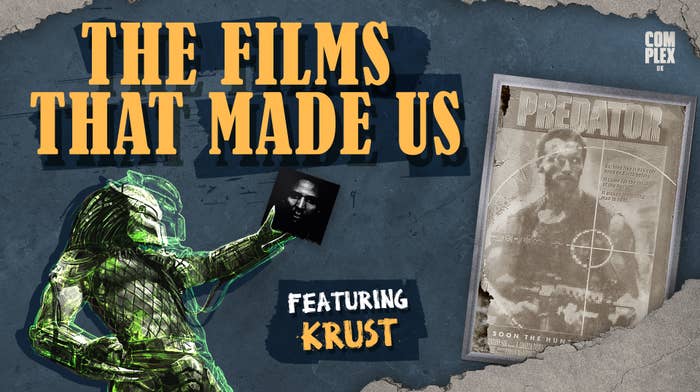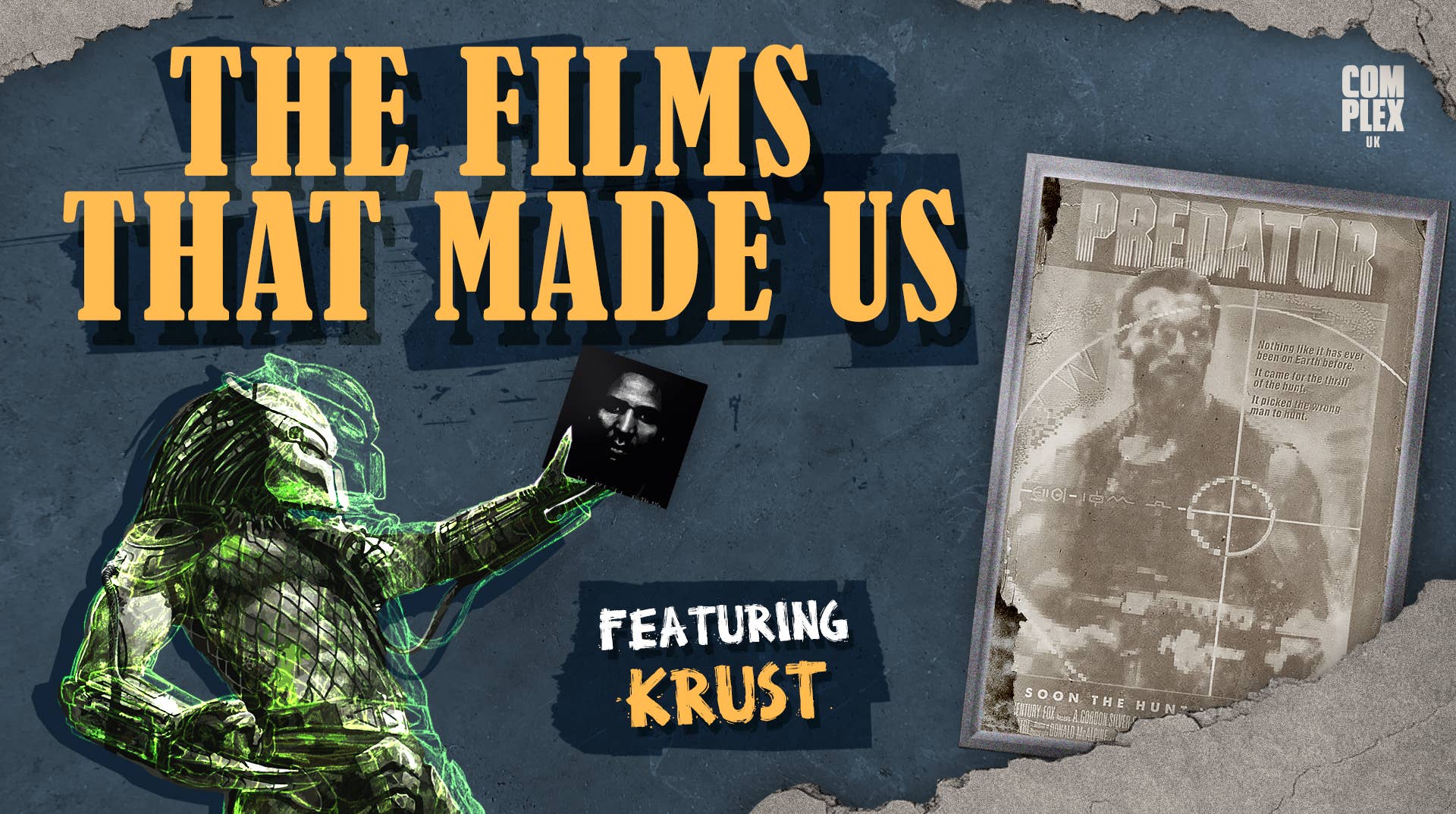
In our new series ‘The Films That Made Us’, we take a look back at the films that have shaped British music over the last three decades. In today’s edition, we talk to pioneering jungle DJ and producer Krust about the ‘Predator’ films and their insidious influence on jungle.
Six tracks into Ancestorz (Roots of Jungle), the new album by British jungle pioneer Congo Natty (out next month), a British voice says: “America got hip-hop. Jamaica, they got their ragga. We got jungle.” The voice belongs to Ryme Tyme, an MC of Kool FM renown, and he’s speaking on Jungle Fever, a documentary broadcast on BBC 2 in September 1994.
Jungle hadn’t been around long before it was declared a phenomenon, a next big thing, worthy of terrestrial television coverage and cause for excitement in post-Thatcher Britain. “I think it’s just coming from soul, reggae…” says Fabio, pioneering jungle DJ, in the same documentary. He and fellow DJ Grooverider effectively birthed jungle at their London club night, Rage. They grew up listening to reggae and lover’s rock at blues parties in Brixton before switching to jazz, funk, then disco, electro and acid house. When jungle became its own thing in 1992, it also took Reese bass from techno, breakbeats from funk and hip-hop, toasting from dancehall, chords from pop, vocal samples from new wave, “and even jazz,” adds Fabio, “cos it’s quite freestyle as well.”
But jungle’s influences weren’t limited to music. 1994 was also the year that Remarc and Lewi Cifer, two producers from London, released “Ricky”, a rapid jungle cut built around a sample of Cuba Gooding Jr. screaming the track’s title. That sample came from Boyz N The Hood, a film about three friends growing up on the streets of LA whose impact on hip-hop culture is well known today.
According to Bristol jungle legend Krust, “Ricky” represented the consummation of jungle’s love affair with Hollywood. “All these samples, that’s what made those early jungle tunes,” Krust says. “It does something to your mind, or it’s said in a way that, at three o’clock in the morning, when you’ve just done your second E, this terrible beat drops and this vocal comes in, and it sends a chill up your spine.”
Two years earlier, jungle’s most celebrated son, Goldie, released his breakthrough track “Terminator”, sampling a line from the Arnold Schwarzenegger robo romp. Deep Blue’s “The Helicopter Tune”, one of the biggest jungle tracks of 1993, recalls the sound of the whirlybirds in Apocalypse Now. The influential jungle producer Rob Haigh, also known as Omni Trio, talked about the film composer John Barry (Dr No, Goldfinger, King Kong) as an influence, and even remixed the theme from Séance on a Wet Afternoon. Dillinja sampled Vangelis’ Blade Runner score on his 1995 single “The Angels Fell”, naming it after a line from the film. Then there was Devan Gray, a revered producer with records on Ray Keith’s jungle label Dread Recordings, who released music under the name Bladerunner.
Not everyone agrees which film had the biggest impact on jungle. But it’s hard to ignore Predator, a franchise that debuted in 1987 when Arnold Schwarzenegger’s rippling war vet, Dutch, led a band of soldiers into the Mexican jungle. Among the resplendent fauna, Arnie and co. find The Predator, an alien hunter with dreadlocks and an invisibility suit who tracks his prey for sport. The Predator recurred in each of the blockbuster franchise’s seven instalments (including two Alien vs Predator spinoffs and Prey, due for release in 2022) while cycling through battles with Danny Glover, Adrien Brody and Trevante Rhodes.
While Predator films got dafter with each sequel, the first two instalments were a gripping frenzy of violence, horror and human survival—“aggressive and beautiful and dark,” as Krust says in Joe Muggs’ book, Bass, Mids, Tops: An Oral History of Sound System Culture. There was something about the frantic modern warfare depicted in Predators 1 and 2 that captured the imagination of the jungle scene. “You’re ghostin’ us, motherfucker. I don’t care who you are back in the world. You give away our position one more time, I’ll bleed you,” hisses a voice in Intense’s shuddering 1993 jungle tune, “Journey To The Unknown”. This was Bill Duke’s ‘Mac’ character in Predator, muttering a chilling warning to his hapless comrade Dillon.
DJ and producer Shimon sampled another of the film’s most famous lines on his 1994 track, “The Predator”: “She said the jungle, it just came alive and took him!”. Hyper-On Experience sampled Predator 2 on “Lord Of The Null Lines”—a member of the film’s antagonistic drug gang, the Jamaican Voodoo Posse, shouting “Fucking voodoo magic man!” over a tangle of breaks. You’ll also hear Predator in Peshay’s “Predator”, Future Sound of London’s “Egypt”, Jungle Terrorists’ “Ain’t No Man” and Ed Rush & Nico’s “Technology”. The sleeves of jungle records like Foul Play’s Vol. 4 and React’s Artcore compilation evoke Predator’s thermal vision. Ray Keith’s “The Chopper” also gives a nod to one of the film’s most immortal lines.
Modern-day acolytes of the jungle sound are still mining the Predator franchise, like Teebee, who sampled Alien vs Predator on “Hunter”, and Burial, who sampled the 2010 film Predators on both “Temple Sleeper” and “Dark Gethsemane”. Junglist royalty like Goldie and Doc Scott regularly pay tribute to Predator on Instagram and Twitter. And on “Original Nuttah”, possibly jungle’s biggest anthem, UK Apachi raps: “Badder than the Terminator and the Predator.” “I’m just following in the long line of producers who have sampled textures and contexts to set a tone and an atmosphere in their composition,” says Krust. “So a film like Predator? Come on, man, that’s b-boy culture all over it! Arnold Schwarzenegger fighting a fucking alien?! It’s a classic.”
Schwarzenegger was born in an Austrian village in the 1940s, his dad a former Nazi soldier, and he once said the highlight of his childhood was the day his family bought a fridge. He vowed to move to America when he saw some depiction of Hollywood on TV. By 1987 he was among the most famous people in the world. “That’s the guy that said, ‘If they can’t pronounce my name, they’ll never forget me,’” Krust enthuses. “He, to me, epitomises that DIY mentality, and that’s what hip-hop culture’s about. There’s no time to wait and be pleasant. Hip-hop culture demands you go in there and take it. And that’s what b-boyism’s about—busting a move, having fresh kicks, fresh outfits, fresh attitudes, being an original. So if you find a film with a loop in it that has something that’s fucking next-level credible, you go down in history.”
In Predator, Arnie is less an actor than a character, a headline act whose work you paid for purely to watch him. Which is also what you want from jungle, characters like UK Apachi, General Levy and The Prodigy’s Keith Flint who, like Arnie, could dish out endlessly quotable lines and look fucking sick while they did it. “Ravers have been writing to Mixmag complaining that jungle is killing rave’s happy vibes,” wrote Mixmag’s Jane Headon in 1994. This is how jungle differed from its predecessor hardcore: where rave was built on ecstasy, positivity and happiness, jungle had edge, and more than a little sense of danger.
The sound’s association with violence has since been senselessly oversimplified by people who have never set foot in a rave. But in a 2020 interview, Fabio said: “Jungle went messy, there’s no two ways about it,” touching on the regular presence of gangsters, guns and crack cocaine at jungle nights. Crime eventually drove many ravers away from the scene, but for a while, the junglists embraced the aggression. As Simon Reynolds points out in his 1999 book, Energy Flash, track titles—like Renegade’s “Terrorist”, Nasty Habits’ “Shadow Boxing”, Marvellous Caine’s “Hitman” and Krust’s “Warhead”—were clear indications of junglists’ obsession with combat.
“We were fighting the establishment,” says Krust. “You gotta remember: we were all kids from the streets.” He grew up on the Knowle West estate—also home to Tricky—and will tell you that Tony Blair once called it the worst council estate in Europe. “Hip-hop came out of the rubble in the Bronx,” Krust says, “and jungle, for me, was our version of what they were doing. It was British street music. It was built from the struggle, from the desperation, from the inspiration, from the frustration, from a lack of care, from the destruction of our communities, through the destruction of our education system, through the constant fucking racism, bigotry, all the isms. It was that constant beating down of society and culture, and this was our response to it. We said: ‘Maggie, this is what we’ve got for you: ‘Warhead’. Tony, this is what we’ve got for you: ‘Terminator’.”
Krust made the most cinematic jungle of all. His 1999 album, Coded Language, is a filmic jungle opus, its title track a work of truly curtain-raising atmospherica, all wind-tunnel breaks and a sermon from the poet Saul Williams—“breakbeats have been the missing link connecting the diasporic community to its drum-woven past!”—equally eloquent and unhinged, sounding like a cross between Samuel L. Jackson in Do The Right Thing and a man waving a can of K cider around Leicester Square. Krust’s hallmark was long tracks, masterworks like 1997’s “Soul In Motion” and 1998’s “True Stories”, which are little more than relentless, utterly addictive drum loops sustained over more than 10 minutes.
He tells me his methods of composition were influenced by cinema. Predator spins around the moment when, at the end of its second act, the Predator vanquishes the last of Arnie’s comrades, leaving the Austrian hulk alone in the jungle with his dreadlocked enemy. “First time I watched it, it blew me away,” Krust says. “That was the first time you saw a film with a double ending. So they killed off everybody. Then it was Arnie’s turn. Another 45 minutes of Arnie fighting this fucking beast by himself. They took the format somewhere totally different. So, for example, when I made ‘Soul In Motion’, that’s what was going on in my mind: break down the original arrangement, and then reformat it into something new.”
The more you talk to Krust, the deeper he gets.
He likens jungle to punk, a movement of youth against the status quo; he talks about the prison industrial complex (“racism is a business model”); he proudly explains why he hasn’t taken the Covid-19 vaccine and challenges anyone who writes him off as a conspiracy theorist. “The problem what I have with humanity is somehow we’ve forgotten that we’re on a rock going millions of miles an hour around a ball of fire,” he says. “How the fuck is anything ‘normal’?” He also compares cinema’s obsession with sequels and remakes to modern electronic music, which too often falls back on reincarnations of old sounds—Predator sequels and the latest jungle revival included. “I just keep an open mind. I can’t prove anything, but I can’t disprove anything either. And as long as we’re on a ball of rock, spinning round a ball of fire, you gotta be open to any possibility.”
It’s that anything-goes open-mindedness that allowed music as original as jungle to exist.



